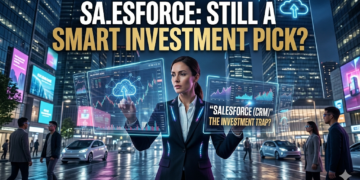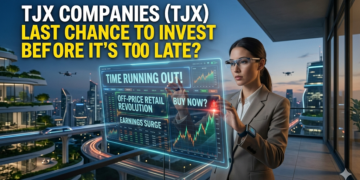The Gap Inc. (NYSE:GAP) is one of America’s most recognizable apparel and lifestyle retailers, known for shaping casual fashion across generations. Founded in San Francisco in 1969 by Donald and Doris Fisher, the company began as a small store selling Levi’s jeans and music records before transforming into a global retail powerhouse. Over the decades, Gap Inc. has become synonymous with modern American style, defining the minimalist, denim-driven aesthetic that revolutionized casual wear. Headquartered in San Francisco, California, the company has grown into a portfolio of powerful brands that span multiple market segments — including Gap, Old Navy, Banana Republic, and Athleta — each designed to cater to distinct consumer demographics and lifestyles.
Gap Inc.’s flagship brand, Gap, remains an enduring symbol of effortless, classic clothing, with a focus on denim, tees, and wardrobe essentials. The brand’s timeless marketing campaigns — often featuring diverse talent and messages of individuality — have made it a cultural touchstone in fashion advertising. Old Navy, one of the company’s most successful subsidiaries, targets value-conscious consumers and has become a leader in affordable fashion for families, offering inclusive sizing and broad product variety. Banana Republic appeals to a more premium market with contemporary, sophisticated styles and elevated materials, while Athleta, the company’s women’s activewear and lifestyle brand, has become a key growth engine amid the global rise of athleisure and wellness-driven fashion. Together, these brands form a cohesive ecosystem that spans mass-market appeal and aspirational lifestyle positioning, giving Gap Inc. both breadth and resilience in an evolving retail environment.
The company operates thousands of stores worldwide while maintaining a rapidly growing e-commerce presence that has become central to its strategy. As digital transformation reshapes the retail landscape, Gap Inc. has invested heavily in technology, logistics, and data analytics to optimize customer experiences and streamline operations. Its omni-channel approach allows shoppers to seamlessly move between online and in-store touchpoints, reinforcing brand loyalty and convenience. In addition to retail innovation, the company remains committed to sustainability and ethical manufacturing practices, implementing initiatives to reduce waste, use recycled materials, and ensure fair labor standards across its supply chain. These efforts are part of its broader mission to create a more responsible and sustainable fashion ecosystem.
ARTICLE HIGHLIGHT: Tony Zhou of Waton Financial (WTF) Unveils “InfoMan” AI Agent at New Fortune Annual Meeting in Guangzhou.
In recent years, Gap Inc. has undergone a strategic revitalization under the leadership of CEO Richard Dickson, known for his transformative work at Mattel and for reinvigorating the Barbie brand. His vision focuses on restoring creative energy across the portfolio, strengthening brand identity, and achieving consistent financial performance through operational discipline and innovation. The company’s renewed emphasis on design excellence, digital-first engagement, and efficiency marks a turning point in its decades-long legacy. With more than five decades of heritage, a global presence across over 40 countries, and a customer base that spans generations, Gap Inc. remains one of the most influential and enduring names in retail fashion — a brand continually evolving while staying true to its roots of inclusivity, accessibility, and authentic American style.
A Legacy Retailer Reinventing for Modern Growth
Gap Inc. (NYSE:GAP), a San Francisco-based global apparel powerhouse, stands at a critical turning point as it continues its bold transformation under CEO Richard Dickson. Founded in 1969, the company is one of the most iconic names in American retail, operating brands such as Gap, Old Navy, Banana Republic, and Athleta. For decades, Gap Inc. has symbolized casual American style, but after facing years of declining traffic, outdated branding, and operational inefficiencies, the retailer is now pushing forward with a focused strategy to reclaim its relevance and profitability.
The momentum behind this comeback has started to gain Wall Street’s attention. Jim Cramer, host of CNBC’s Mad Money, has repeatedly highlighted The Gap’s revival efforts throughout 2025. Earlier in the year, he remarked that the market was “finally starting to appreciate CEO Richard Dickson’s leadership,” calling him the right person to stabilize the company’s balance sheet, modernize its image, and deliver long-term shareholder value. With Gap’s market capitalization hovering around $4.5 billion and cash reserves exceeding $2.6 billion, the company is better positioned than in previous cycles to execute its turnaround and withstand macroeconomic volatility.

CHECK THIS OUT: Why Nebius (NBIS) Could Outperform CoreWeave & Dominate the $9B AI Infrastructure Market and Is Lucid Group (LCID) Running Out of Cash? $875M Note Deal Raises Alarms.
Dividend Strength Signals Financial Confidence
On November 12, 2025, Gap Inc. announced that its board of directors had approved a fourth-quarter fiscal 2025 dividend of $0.165 per share, payable on or after January 28, 2026, to shareholders of record as of January 7, 2026. This marks yet another consistent payout amid challenging retail conditions, underscoring management’s confidence in the company’s cash flow and balance sheet stability.
A dividend yield of roughly 3 % is rare in retail, particularly for a company that is simultaneously investing in brand rejuvenation and operational modernization. The continued dividend not only attracts income-oriented investors but also reinforces the credibility of management’s financial discipline. With over $2.6 billion in cash on hand and manageable debt levels, Gap Inc. is proving that it can sustain shareholder returns while funding the capital expenditures necessary for growth across its portfolio.
Leadership Driving Cultural and Financial Relevance
Under Richard Dickson—best known for revitalizing Mattel Inc. and bringing Barbie back to cultural dominance—Gap Inc. has pivoted sharply toward creative authenticity and operational efficiency. His tenure has introduced a new era of brand storytelling, visual identity, and digital-first retail experiences. Collaborations with designers such as Zac Posen, the company’s new creative director, signal a renewed focus on elevated product design and fashion relevance.
Cramer’s commentary on Mad Money echoed that sentiment, noting:
“He’s got 2.6 billion in cash, got a 3 % yield. This deserves to trade much higher. Somehow it dropped. This thing has cascaded lower for absolutely no reason whatsoever. This is the stock to buy in retail.”
This endorsement reflects growing investor recognition that Gap’s execution is improving faster than its share price implies. As of late 2025, the company’s shares have gained approximately 1.7 % year-to-date — a modest move that belies the depth of its turnaround efforts.
Strength Across Core Brands and Strategic Expansion
The Gap brand portfolio remains a powerful competitive advantage. Old Navy continues to be the company’s volume driver, contributing roughly half of total sales through affordable fashion and value-oriented appeal. Athleta, Gap’s women’s activewear line, has become one of its fastest-growing brands, capitalizing on the global athleisure trend and offering higher margins. Banana Republic is undergoing a strategic rebranding to return to its luxury roots with a focus on premium materials and timeless design. Meanwhile, the flagship Gap brand has refocused on denim and everyday essentials, connecting with both Gen Z and millennial shoppers through digital marketing and influencer partnerships.
Operationally, Gap Inc. has made major strides in inventory management and supply-chain efficiency. By reducing SKU complexity and leveraging AI-driven forecasting, the company has improved turnover ratios while lowering markdowns—an important driver of gross-margin recovery. In the third quarter of 2025, Cramer highlighted that all four major divisions were showing comparable sales growth—Gap up 7 %, Banana Republic up 4 %, Old Navy up 3 % — “almost double what people would expect.” This broad-based improvement suggests that the turnaround is not limited to one brand but is company-wide.
Rebuilding Investor Confidence and Long-Term Outlook
While Gap Inc. has faced setbacks in recent years due to shifting consumer preferences, tariff pressures, and global supply-chain disruptions, the current trajectory indicates that the worst may be behind it. The company sources only about 11 % of its goods from China and Mexico, limiting its exposure to geopolitical risks and trade volatility. With a strong cash position and controlled debt, Gap has the financial flexibility to invest in innovation while returning capital to shareholders.
Market analysts increasingly view Gap as an undervalued turnaround story. At current valuation levels, the stock trades at a discount to other specialty retailers like TJX and Costco that Cramer also endorses. If management continues executing on brand revitalization and margin expansion, GAP shares could see significant re-rating potential over the next 12 to 24 months. Investors who believe in long-term consumer brand equity and dividend-backed stability may find Gap Inc. to be a compelling addition to a retail-oriented portfolio.
Conclusion: A Retail Comeback in Progress
Gap Inc. (NYSE: GAP) represents a legacy brand with renewed momentum and a disciplined strategy to reclaim its leadership in the apparel industry. Under Richard Dickson’s visionary leadership, the company is demonstrating the right blend of creative energy, financial prudence, and digital adaptation to thrive in a competitive retail landscape. With dividend stability, solid cash reserves, and brand revitalization underway, Gap Inc. stands as one of the most intriguing turnaround plays in the consumer discretionary sector for 2026 and beyond.
READ ALSO: Above Food (ABVE) to Issue 1.1 Billion New Shares in Merger and Perpetua Resources (PPTA) Soars 171% as U.S. Approves $1.3B Gold-Antimony Mine.






